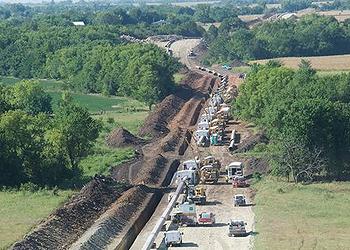
GREAT FALLS, Montana, November 9, 2018 (ENS) – A federal judge in Montana Thursday overturned the Trump Administration’s approval of the Keystone XL Pipeline and issued an injunction stopping all construction of the pipeline that would carry heavy crude oil from Canada’s tar sands to refineries in the United States.
U.S. District Judge Brian Morris ruled in favor of the plaintiff groups: Indigenous Environmental Network, North Coast Rivers Alliance, Northern Plains Resource Council, Bold Alliance, Center for Biological Diversity, Friends of the Earth, Natural Resources Defense Council and Sierra Club in the litigation they brought to stop the Keystone XL Pipeline on environmental grounds.

Plaintiffs filed their lawsuit in March 2017 in the U.S. District Court for the District of Montana.
Judge Morris ruled that President Donald Trump violated federal environmental laws when his administration claimed that the Keystone XL was consistent with the public interest.
President Barack Obama denied TransCanada the presidential permit it needs to cross the border. President Trump reversed that decision.
Trump signed an executive order that led to approval for the Keystone XL pipeline just days after he took office in January 2017.
Judge Morris ruled that Trump’s approval of the Keystone XL pipeline violated the National Environmental Policy Act, NEPA, and the Administrative Procedure Act because:
1) President Trump disregarded prior factual findings by former Secretary of State John Kerry that the Keystone XL Pipeline would unjustifiably worsen climate change,
2) failed to conduct an adequate survey of Native American cultural resources that would be harmed by the pipeline,
(3) failed to provide adequate modeling of potential oil spills and their impacts on water resources,
(4) failed to analyze the cumulative effects of this project on greenhouse gas emissions, and
(5) failed to address the effects of current oil prices on the viability of the project.
The injunction against all construction work will stand until the Trump administration can complete a supplemental review on these five points.
This ruling follows the court’s previous decision, on August 15, 2018, to require additional analysis of the new route through Nebraska that is supposed to protect the Ogllala Aquifer that provides groundwater to most Midwestern states.
The Keystone XL pipeline is a proposed project of the Canadian corporation TransCanada. The Alberta-based company first proposed the $8 billion project 10 years ago.
The 36-inch-diameter crude oil pipeline would begin in Hardisty, Alberta, and extend south to existing pipeline facilities near Steele City, Nebraska, for onward delivery to Cushing, Oklahoma, and refineries on the Texas Gulf Coast.
The Keystone XL route goes through the states of Montana, Nebraska and South Dakota and the provinces of Alberta and Saskatchewan.
Keystone XL still requires federal Bureau of Land Management permits and authorizations in Montana.
This morning, President Trump reacted angrily to the ruling, “It was a political decision made by a judge. I think it’s a disgrace,” Trump told reporters as he left the White House on his way to France.
Trump indicated that his administration would appeal the ruling from Montana federal Judge Brian Morris to the San Francisco–based Court of Appeals for the 9th Circuit, which has often ruled against his administration. He said he is putting judges favorable to his goals on the 9th Circuit bench.
Trump said, “48,000 jobs. I approved it. It’s ready to start.”
The State Department has estimated that the project would provide up to 42,000 temporary construction jobs, and 35 direct permanent jobs if completed.

“Today’s ruling is a victory for the rule of law, and it’s a victory for common sense stewardship of the land and water upon which we all depend,” said Dena Hoff, Montana farmer and member-leader of the Northern Plains Resource Council.”
“Despite the best efforts of wealthy, multinational corporations and the powerful politicians who cynically do their bidding, we see that everyday people can still band together and successfully defend their rights,” said Hoff. “All Americans should be proud that our system of checks and balances can still function even in the face of enormous strains.”
“This is a complete repudiation of the Trump administration’s attempts to evade environmental laws and prioritize oil company profits over clean water and wildlife,” said Jared Margolis, senior attorney with the plaintiff group Center for Biological Diversity. “Keystone XL would devastate species and put communities at risk of contamination. There’s simply no excuse for approving this terrible project. We need to move away from fossil fuel dependence, not support more devastation.”
The ruling is a setback for a pipeline that investors are already questioning. TransCanada has not yet announced a final investment decision on whether to build Keystone XL even if the company receives all the required permits.
Copyright Environment News Service (ENS) 2018. All rights reserved.
© 2018, Environment News Service. All rights reserved. Content may be quoted only with proper attribution and a direct link to the original article. Full reproduction is prohibited.
